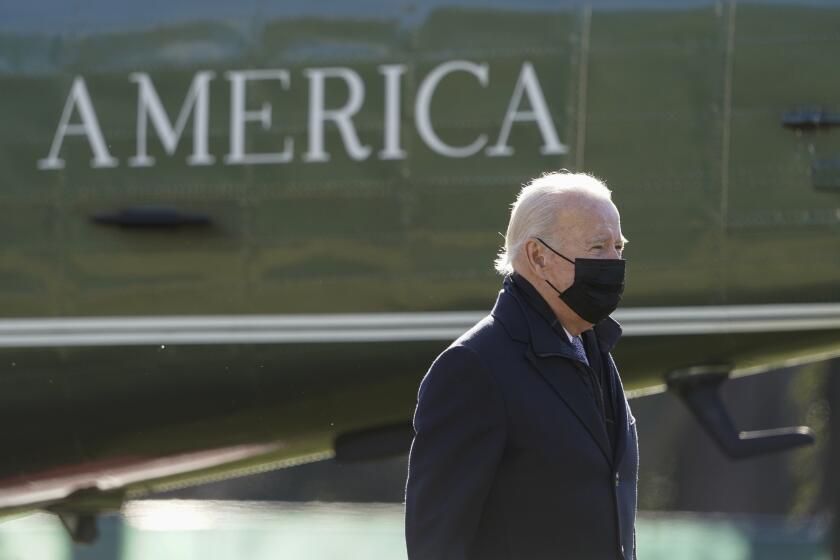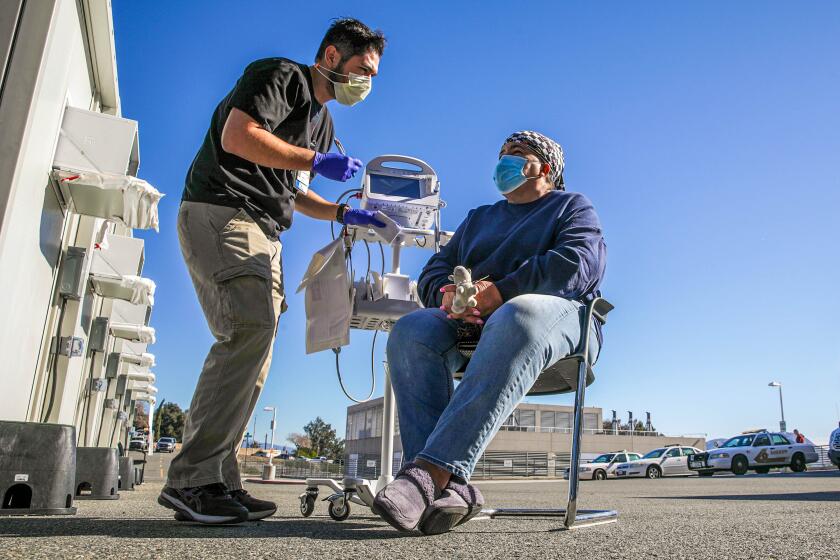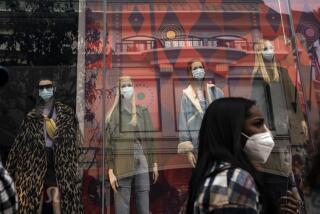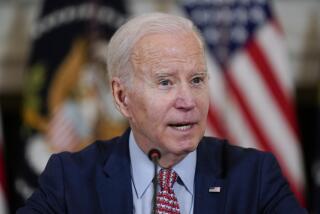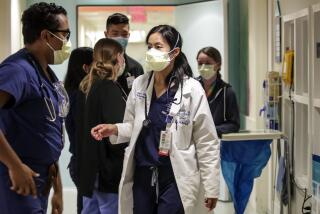‘We’re all frustrated’ on COVID: Biden to boost test availability and send military to help hospitals
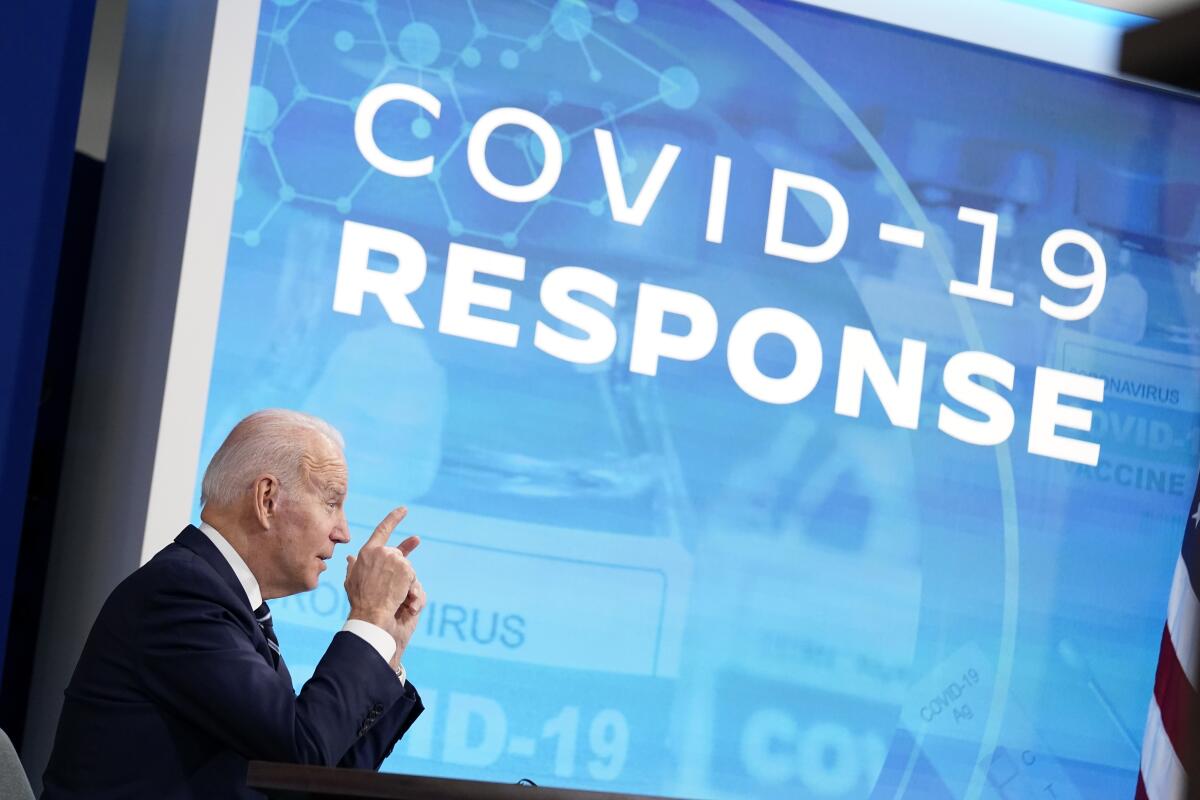
WASHINGTON — As the Omicron variant swamps hospitals with new coronavirus cases, President Biden on Thursday said he would reinforce the country’s healthcare system and make more COVID-19 tests available.
The announcement was a reflection that, despite hopes that the latest wave of the pandemic would be over soon, more resources are needed to help Americans cope with a virus that could be a persistent presence for the foreseeable future.
The military is sending 120 medical personnel to hospitals in six states, the first step in a potential surge of 1,000 service members to be deployed across the country.
In one of the sharpest parts of his remarks, Biden said that “while the military is stepping up as they always do, there are others sitting on the sidelines, or worse, standing in the way.” He encouraged more Americans to get vaccinated and chastised technology companies and some media for allowing misinformation about the pandemic on their platforms.
As a reminder of Biden’s challenges, hours after he spoke the U.S. Supreme Court’s conservative majority blocked his administration’s proposal to require vaccinations or regular testing for workers at large companies. The justices allowed a more narrow mandate, applying to healthcare workers, to take effect.
In his speech, Biden said his administration will double its purchase of home coronavirus tests, from 500 million to 1 billion, to be distributed through a government website that is slated to be online next week. Although only 50 million tests are expected to be available initially, the total procurement represents a longer-term commitment to make testing more easily available.
President Biden plans to speak about the COVID-19 pandemic on Thursday as he faces rising criticism during the Omicron wave.
Wearing a mask, he said, is “part of your patriotic duty” even though “it’s a pain in the neck.” He also acknowledged that “we’re all frustrated” with a pandemic that’s entering its third year.
The military deployment and test purchases show that Biden is pushing forward with plans that were first unveiled last month even though he’s faced criticisms that his efforts aren’t keeping pace with the pandemic.
For example, public health experts have repeatedly warned that cloth masks do not provide enough protection against the more contagious Omicron variant, and they recommend that people wear N95 or KN95 masks.
However, Biden said his administration wouldn’t announce until next week its plans to make high-quality masks available for free even as he encouraged Americans to continue covering their mouths and noses indoors.
Dr. Amesh Adalja, a senior scholar at the Johns Hopkins Center for Health Security, said it’s possible that the Omicron wave will be cresting by the time some of Biden’s initiatives, such as expanded testing, come to fruition.
“The time when people really needed those tests has already passed,” he said. “But there is going to be a sustained need for tests.”
He added, “that’s going to make it easier to navigate a world with COVID.”
Beginning Saturday, people with private health insurance can get reimbursed for the cost of eight at-home coronavirus tests per month. Millions more tests are being provided to schools each month to screen for infections and help prevent classroom closures.
Once the Omicron wave passes, Adalja said, he expects the coronavirus to remain an ongoing threat like other respiratory illnesses. He praised the administration for increasing its focus on reducing the harm caused by the virus with treatments and support for hospitals.
“It’s the medical countermeasures that are the most important thing,” he said.
Some experts are worried that federal resources will be not just late but insufficient.
Dr. Megan Ranney, academic dean at the Brown University School of Public Health, said the potential deployment of 1,000 military medical personnel is “better than nothing,” but “not adequate.” The first military teams will be sent to help at hospitals in New York, New Jersey, Michigan, New Mexico, Ohio and Rhode Island.
After two years, hospitals thought they had a handle on treating COVID-19. But Omicron has hit them harder than ever.
As Omicron established prominence in the country before the holidays, Biden attempted to fortify the nation’s defenses. But the variant has strained hospitals and renewed uncertainty about whether school classrooms will remain open. Omicron is even more transmissible than the Delta variant, which tore through the country last year, and it is also more likely to cause breakthrough infections among vaccinated people.
When it comes to preventing new cases, “there’s not much we can do about Omicron right now,” said Dr. Robert Wachter, chair of UC San Francisco’s department of medicine. “We just got the weather report, and the hurricane is here.”
Though there are indications that Omicron causes less severe illness, the country set a record for hospitalizations this week. Many patients who tested positive were initially admitted for other reasons, such as injuries or heart attacks, but they still risk infecting medical teams who are already shorthanded.
In California, state officials are going as far as allowing asymptomatic healthcare workers who have tested positive for the coronavirus to return to work immediately in order to meet demand.
Meanwhile, students across the nation are walking out of classes, or threatening to, as they demand better virus precautions on campuses.
Biden, who has called the COVID-19 crisis a “pandemic of the unvaccinated,” repeated the assertion again Thursday. He said that even though vaccinated and unvaccinated people are testing positive for the coronavirus, he emphasized that Americans who have gotten their shots are far less likely to become seriously ill or die.
“The single most important thing to determining your outcome in this pandemic is getting vaccinated,” he said.
Get our L.A. Times Politics newsletter
The latest news, analysis and insights from our politics team.
You may occasionally receive promotional content from the Los Angeles Times.
More to Read
Get the L.A. Times Politics newsletter
Deeply reported insights into legislation, politics and policy from Sacramento, Washington and beyond. In your inbox three times per week.
You may occasionally receive promotional content from the Los Angeles Times.
